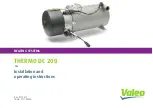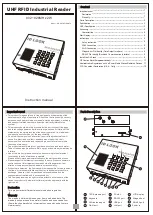
TL37J – 511116-000-EN-A
19
Potential service and safety problems may be detected
by inspecting the aerial platform. This chapter includes
information on properly inspecting the aerial platform and
includes a prestart inspection check list at the end of this
chapter to ensure that no areas are overlooked.
Warning
The potential for an accident increases when operat-
ing an aerial platform that is damaged or malfunction-
ing. Death or serious injury could result from such
accidents. Do not operate the aerial platform if it is
damaged or malfunctioning.
Perform a prestart inspection at the beginning of each
shift, before using the aerial platform on the job. The
inspection site must have a smooth and level surface.
Operator’s Manual
The manual holder is located underneath the platform
controls on the platform (refer to Figure 8.1).
Figure 8.1 –
Operator’s Manual Holder
To inspect the operator’s manual and manual holder:
1. Make certain the Operator’s Manual holder is se-
curely fastened in place.
2. Check to see that the proper Operator’s Manual is
in the holder.
3. Check to see that the manual is complete with all
pages intact and in readable condition.
4. Make certain ANSI publication “Manual of Respon-
sibilities for Dealers, Owners, Users, Operators,
Lessors and Lessees of ANSI/SIA A92.6-2006
Self-Propelled Elevating Work Platforms” is in the
manual holder.
Electrical System
Electrical power is supplied from four, 6 volt batteries.
The batteries supply 24 volt DC electrical power to oper-
ate the aerial platform control system. There is a battery
tray on each side of the machine. Each tray contains
two batteries.
Chapter 8 – Prestart Inspection
Warning
Batteries give off hydrogen and oxygen that can com
-
bine explosively. Death or serious injury could result
from a chemical explosion. Do not smoke or permit
open flames or sparks when checking the batteries.
Caution
Even with low voltage electrical systems, severe arc
-
ing can occur. Electrical shock or component damage
may result from contact with energized conductors.
Use caution when working with any electrical device.
For optimal battery performance, the battery fluid level
must be maintained and the battery connections must
be kept clean.
Battery Terminals
To inspect the battery terminals:
1. Check the top of the battery, the terminals and
cable ends (refer to Figure 8.2). They should be
clean and free of corrosion.
2. If necessary, clean the top of the battery. Clean
the terminals and cable ends with a wire brush or
terminal cleaning tool.
3. Make sure all cable ends are securely fastened
to the terminals.
Battery Fluid Level
To inspect the battery fluid level:
1. Remove the caps from the batteries (refer to Figure
8.2).
Figure 8.2 – Battery tray
2. Visually check the battery fluid level making sure the
level is ¼
″
(6 mm) above the plates.
3. If necessary, add distilled water.
Summary of Contents for TL37
Page 1: ...December 2017 Part Number 511116 000 EN A MANUAL OPERATOR S Serial number 007625 and after...
Page 12: ...Chapter 3 Safety 8 TL37J 511116 000 EN A...
Page 16: ...Chapter 4 Safety Devices 12 TL37J 511116 000 EN A...
Page 18: ...Chapter 5 Gauges and Displays 14 TL37J 511116 000 EN A...
Page 20: ...Chapter 6 Batteries 16 TL37J 511116 000 EN A...
Page 30: ...Chapter 8 Prestart Inspection 26 TL37J 511116 000 EN A 066552 000...
Page 32: ...Chapter 8 Prestart Inspection 28 TL37J 511116 000 EN A...
Page 36: ...Chapter 9 Operation 32 TL37J 511116 000 EN A...
Page 40: ...Chapter 10 Stowing and Transporting 36 TL37J 511116 000 EN A...
Page 46: ......
Page 51: ......
















































